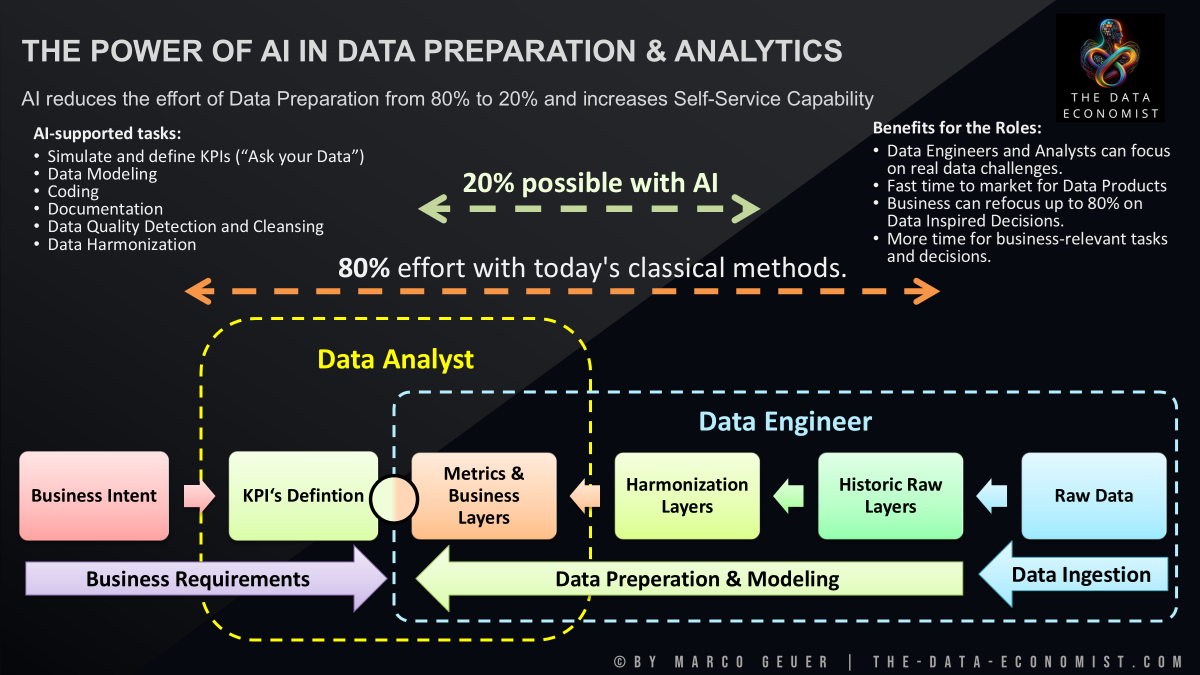The future of data preparation with AI: a revolution in data analysis
How artificial intelligence drastically reduces the effort required for data preparation and creates new scope for strategic decisions
Artificial intelligence (AI) has made tremendous strides in recent years and is increasingly influencing all areas of technology and business. One of the most important areas of application in which AI will bring about major changes is data preparation – an often underestimated but critical process in the work of data engineers and data analysts.
The potential of AI in data preparation
Traditionally, data preparation and data analysis professionals spend up to 80% of their time preparing data before they can begin to evaluate the analysis results and make decisions. This is a problem that has not been solved for decades. The laborious process involves tasks such as collecting, cleaning, harmonising and modelling data, as well as the process of understanding the business. However, AI offers significant efficiency gains here. I am convinced that with the support of AI, we can turn the 80/20 ratio (80% data preparation / 20% data analysis and decision-making) so that the effort of data preparation can be reduced to 20% and we can really focus on deriving good decisions 80% of the time in the future.
This is done with the support of AI by automating activities such as defining and simulating KPIs, data modelling, documentation, identifying and cleaning data quality issues, and harmonising data from a wide range of data sources.
The crucial question: can AI reduce the effort involved in data preparation to such an extent that data engineers and data analysts can focus on their core competencies?
One of the most important questions in connection with the use of AI is: will AI reduce the effort involved in data preparation to such an extent that data engineers can focus on more complex issues and data analysts have more time for the actual analysis and interpretation of the results and their influence on the business?
The answer seems clear: AI has the potential to make this change possible. By automating routine tasks, data engineers can focus more of their attention on more demanding challenges such as optimising big data architectures and developing innovative digital solutions. This not only leads to increased efficiency but also to a faster time to market for data products.
This also opens up a new chapter for data analysts. Instead of dealing with the often tedious task of data preparation, they can once again focus on the actual analysis and the derivation of business-relevant insights. The ability to define KPIs more efficiently and recognise data patterns is also significantly improved by AI, which ultimately leads to more informed and faster business decisions that significantly improve competitiveness.
More personal responsibility thanks to self-service analytics
An additional dimension of the use of AI lies in the increased self-service capability of data platforms. AI helps to ensure that non-technical users such as executives, marketers, salespeople, etc. can also access and analyse data more easily. This leads to a democratisation of data analysis and makes it easier to make data-based decisions faster and more independently.
Challenges and opportunities
Despite the many advantages that AI brings to data processing, there are also challenges. These include ensuring data quality in the source systems, data protection and the provision of suitable AI models. However, the opportunities clearly outweigh the challenges: companies can increase their efficiency, accelerate data-driven decisions and ultimately strengthen their competitiveness through in-depth insights from their data.
Conclusion: the paradigm shift in data work
AI will permanently change the role of data engineers and data analysts and strengthen their role. Tasks that previously took a lot of time can be automated and standardised, while human expertise is increasingly channelled into analysis, problem solving and strategic decision-making.
With the support of AI in data preparation, the full potential of data is realised and companies can deploy their talent where it adds the most value – in solving complex problems and shaping forward-looking business decisions.

More articles on related topics:
Business Analytics, Data Analytics, Artificial Intelligence, Data Driven Culture, Data Driven Company, Data Management, Decision Intelligence, Data & AI Strategy, Data Preperation, Data Engineering
- Geändert am .
- Aufrufe: 3807
